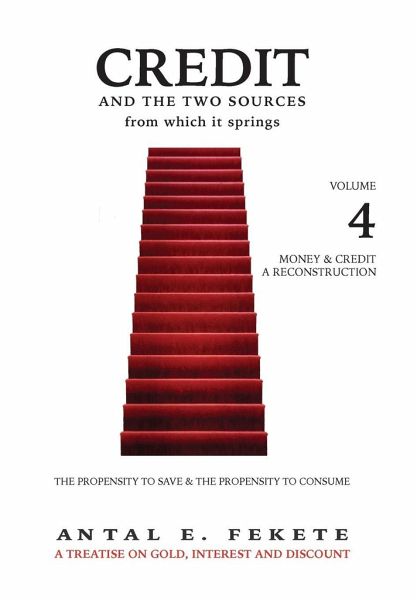
Credit And The Two Sources From Which It Springs
The Propensity To Save And The Propensity To Consume - VOLUME IV - Money & Credit - Reconstruction
Herausgeber: Coppenolle, Peter M van
Versandkostenfrei!
Versandfertig in über 4 Wochen
62,99 €
inkl. MwSt.

PAYBACK Punkte
31 °P sammeln!
Money and Credit - Volume IV Austrian economist Prof. Antal Fekete has published his Opus Magnum in 4 volumes or about 900 pages. This final volume contains several proposals to recover economic science and reinstate Carl Menger's main tenets. The economic abuses, conundrums, crises, aberrations, unemployment, credit abuse and general evaporation of savings cast a large shadow over mainstream economic science. These conundrums and financial crises are of their own making and solutions are at hand ! The current crop of economists risks being buried under the rubble of he collapse of a well-fare...
Money and Credit - Volume IV Austrian economist Prof. Antal Fekete has published his Opus Magnum in 4 volumes or about 900 pages. This final volume contains several proposals to recover economic science and reinstate Carl Menger's main tenets. The economic abuses, conundrums, crises, aberrations, unemployment, credit abuse and general evaporation of savings cast a large shadow over mainstream economic science. These conundrums and financial crises are of their own making and solutions are at hand ! The current crop of economists risks being buried under the rubble of he collapse of a well-fare state, which is just a euphemism for a parasitical 'system' that drains both physical and intellectual capital. It sustains one group at the expense of another and cuts perpendicular to justice in the broadest sense. Hot 'money' is the result and tax administrations hunt it down for their share of the loot. If we want to preserve credit and civilisation, we need to revert back to honest money and proper economic science, even if ideologists don't like it one bit. Economic collapse is real and has burried other civilisations under its rubble. We are not exempted ! Cleaning the Augean stables will be a Herculanean effort. But if we do not start this unpleasant job of resisting parasitical elements, than nature will do it for us. This parasite kills its host by spending everyone's savings and subjecting all future generations to serfdom. In this fourth volume several propositions have been made to the finer subjects of economic science such as the future markets, the economics of mining and more. In its final section on monetary cranks, the tables are reversed. It helps of course if one has read the other volumes. By reversing the tables, the parasite is exposed and hope may be restored for future generations. The myths surrounding the gold standard and silver coinage are all debunked authoritatively. Proper economic science, without ideological accretions are proposed and the study of monetary science on international trade lies at its hart. `the need for central banking is questioned, as the world has always done fine without them, just as the term macro-economics is just a euphemism for a pathological need of centralised control. The latter is the main cause of our economic problems. A full colour hardcover publication of Fekete's magum opus. Volume IV of a never published Treatise on Gold, Interest and Discount and the hitherto undiscovered links between them, necessary for the distributed decision making on interest rates and discount rates, savings and consumption as well as hoarding. A penetrating study of the inner working of the gold standard. Academic work with bibliography, notes and illustrations.


